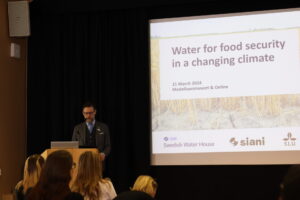Malin Falkenmark’s ideas set the tone at 2014 World Water Week
On Sunday 31 August, the very first day of 2014 World Water Week in Stockholm, leading scientists gathered for the seminar “Managing Centres of Booming Water Expectations in Basins and Regions of Change”. The seminar of SIWI, SEI and Stockholm Resilience Centre, is a long-standing joint venture in honour of Prof. Malin Falkenmark, a leading edge scientist and water and sustainability conceptualist.
The core topic of the seminar was the challenge to reach urban water security. Cities are engines of economic growth, but that also raises water expectations, which might turn into constrains for growth. Many of the booming water centres are also located in regions with high water stress such as sub-Saharan Africa and South Asia. Malin set the scene painting a grim picture of challenges with competing water demand, water pollution issues (80 percent of urban waste water outflow left untreated) and doubling of domestic water demand. Large cities are seen as islands but have to enter into a continued network of water flows. Five year plans will help prepare for urgency and attention to drought and floods.
Dr. Johan Rockström pointed to the dilemma that in our new hyper connected world where ecological, social and economic tensions create direct reactions, we still do not completely understand the links between rural and urban systems. Two thirds of cities have not yet been built so there is an enormous potential for building resilient cities and acknowledge its dependence on retaining water within basins. We cannot isolate the urban water use which is more apparent when adding climate change and water-related shocks.
Last of the introductory speakers were SEI researcher Mr. Per Klevnäs focusing on urban centres from an energy perspective. The main point made was that we can meet the future energy need in a sustainable way. The 15 year outlook presented an opportunity to change policy to meet the enormous challenge of access to energy and a growing demand in general. The use of renewable energy is already closing the gap and there are even more innovation possibilities. Potential energy efficiency gains is the biggest opportunity and still largely untapped source of energy.
From Nepal we heard Dr. Dipak Gyawali of the Nepal Water Conservation Foundation criticise the lock-in effects by large development infrastructure projects and donor incoherence. The complexities of rapid growth and urban demand spurred on by remittances are difficult to manage. Despite poor water and sanitation in the cities people generally have better access to energy, hospitals and jobs than in mountain villages which means urban migration will continue leaving the land unfarmed and challenging the urban/rural boundaries. Plugging the leakages in Kathmandu City losing 70 percent of the water supply should be an obvious start for donor concern. It is not.
Quingdao city along the north-eastern coast of China faces high water risks exacerbated by economic and population growth. There is a need to use non-conventional water sources for energy production but this consideration is forgotten in planning. Dr. Lijin Zhong at the World Resources Institute recommended to exploit unconventional water resources. This because the choice of water sources allocation will have direct impact on the energy consumption and the urban water system faces an inevitable rise in energy intensity and carbon emissions.
The population of urban centres in Africa will nearly quadruple, keeping the world’s most rapid rate of urbanisation. Closing the water and energy loops are imperative for planning. There is also a mismatch within cities and lack of urban master plans which create fragmentation. Urban planning and moreover Integrated Urban Water Management is needed. Rainwater harvesting is needed and is currently executed in some cities in West Africa – at least at a household level. Other urgent issues are storm water management, treatment of water, and land use planning. The regional water and energy markets are growing in Africa, but there are still gaps in integrating energy and water planning and cross-sectoral understanding, argued Dr. Akissa Bahri of the African Water Facility.
The panel discussion moderated by Dr. Johan Kuylenstierna, SEI, discussed the topic of cities as dwellings, resource hungry, and vehicles of change. The limitations of integrated approaches, compared to resilience approaches were highlighted as well as the limitations of planning on the higher levels above household. The voices of the stakeholders need to be not only heard but recognised. The link between water, energy and food production was highlighted – when planning for either make sure not to omit the other. This is both an institutional, academic and policy limitation. Panellists identified shocks such as floods, food price spikes and social unrest as drivers of change.
Also promoted at the seminar was the Concerned Scientists Statement on Water, Hunger and Sustainable Development Goals, which stresses rainwater harvesting as the key to eradicate hunger, as well as the book launch for “Water Resilience for Human Prosperity”.
Watch the seminar webcast or read more in the World Water Week Online Programme.








